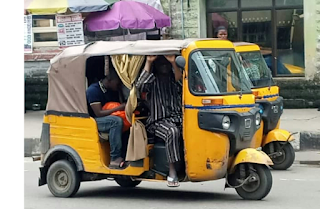Menace of Keke Napep
Tricycles, commonly known as “keke” is propelled by an electric or internal combustion engine. It is a motorized three-wheeled vehicle for transporting two to four passengers per trip. The history of Keke can be traced directly back to the government of Mohammed Buba Marwa who was the military governor of Lagos state from 1966 to 1999. He first launched the use of tricycle as a means of commercial transportation in Lagos.
The word “keke” is directly derived from Yoruba language. However, thepopularity of keke across the nation can be attributed to the national poverty eradication programme NAPEP which was inaugurated under the administration of former president Olusegun Obasanjo to alleviate poverty and provide economic empowerment to the people. Thus, the name keke NAPEP gained popularity across the nation.
NAPEP in 2001 launched and distributed two thousand units of green colour tricycles with the inscription Keke NAPEP as a commercial means of transportation in the Federal Capital Territory FCT Abuja. This was to serve as a strategy to curb idleness and produce a productive workforce. According to NAPEP, the justifications for the distribution of keke nationwide was to ensure mass gainful employment for the idle workforce, to sustain wealth creation, provide affordable mass transit services; to provide opportunity for the growth of other anxillary services such as vending, portal water, mobile food canteens, mobible grocery shops, post delivery,e.t.c, facilitate technical entrepreneurs and related small businesses that will in turn facilitate transfer of technology and facilitate other subsidiary businesses such as the sale of tricycle spare parts, operators, mechanics and building oflocal content, among others.,
In 2010, following the increased threat to security in plateau state, occasioned by various crimes in major cities allegedly perpetrated by some commercial motorcycle operators, the former governor of plateau state Jonah Jang, signed into bill, prohibiting the operation of commercial motorcycle operators within the Jos/Bukuru metropolis. He went further to introduce these tricycles as a means of transportation to replace commercial bikes known as okada to fill the void created by the ban to meet the demands of transporting passengers to and fro. This caused a strong opposition from okada riders and the passengers they carry. The argument made against the ban was that okada has held back the urge of the youths to join criminality in addition to making the lives of ordinary people easy.
This argument motivated the former government to look for an alternative, leading to the idea of tricycles (keke).The tricycles were given as loans to be paid back installmentally in banks before the riders could take full ownership of it. As part of the scheme, the government released over 500 taxi cabs and with time people began to accept the idea of the tricycles because they were not expensive to buy, use and maintain and they easily maneuver very busy roads, especially during serious hold-ups and when many people are eager to get to their destinations at the same time. Massive importation of tricycles encouraged more people to take to that line of self-employment by earning a living and boosting the economic life of the state.
In recent times, keke napep has become a terror on wheels, another killer in disguise and prime sources of trauma to commuters and other motorists on the roads of jos, from criminal activities, to reckless over speeding leading to grievous accidents. There is a thin line difference between motorcycles and tricycles. In real sense, what most motorcyclists did after their ban was to dispose their motorcycles and purchase tricycles in order to be in business. Which means it is the same personalities behind both the banned motorcycles and the new tricycles that are still over speeding, committing heinous crimes and attacking commuters. It is simply liked to the saying” no matter how you dress a pig, it remains the same’’.
Just like the case of One Mr. Nazin Panyak, a former MTN regional staff, who was sent to his early grave due to this criminal activities, it was revealed that Nazin boarded a tricycle by 7PM from Solomon Lar amusement park to federal low-cost, before he boarded the tricycle, he saw two men at the back, he told one of the men to adjust so he could sit but the man initially refused instead, he came down and wanted Nazin to sit inside but Nazin declined the offer, the man later agreed to sit down and Nazin sat, but confronted the man about his refusal to adjust for him, the quarrel escalated and before Nazin could get hold of what was happening, one of the men brought out a knife and stabbed him on his chest, although he struggled and the driver kept moving. Sadly, Nazin lost his life due to so much loss of blood, valuable items like his phone were taken from him and his body was dumped by the roadside.
The next day, passerby saw the lifeless body and alerted the public, some people were able to recognize him as an MTN staff, the matter was reported to the MTN office, who in turn tracked his number, only to find out that someone has been communicating with the phone, security personnel went to the area where the number is being tracked, they later discovered that a lady was with the phone, and the said lady had gone to Pankshin, a local government area in plateau state, the lady was invited over and was detained, she was questioned about the stolen phone, she revealed that her boyfriend gave her the phone. The driver and the two syndicates were arrested.
On daily basis, there were complaints about people losing their personal belongings to these perpetrators of evil. An example of this, is the case of one Miss Sunday Nneka who also shared her story, according to her, on a Sunday afternoon around 2pm, she boarded a tricycle with two men already seated, halfway to her destination, a gun was pointed to her and she was instructed to handover her phone and everything valuable inside her bag, then she was kicked out of the tricycle.
Another similar case is the case of blessing Anthony, a student of the University of Jos who boarded a tricycle with her friend at about 8pm headed to the main library to read for their then upcoming exams. According to her, she felt it was a conspiracy because they met the driver and two men already seated, with one of them pretending to be in a haste, after pretending to be on a call.Telling someone on the phone that he was close by. In her words “5 minutes later, the same guy stopped and told the driver that he wasn’t going further anymore because he forgot something”. Before the girls knew it, their phones were snatched from them. “one of them pointed a gun at us saying we should hand over our phones and any other thing we had on us, we gave them and were pushed out of the keke and they drove off leaving us stranded “she added.
Mr. Filibus, an eye witness revealed that about 11:30am on a Friday, three men in a tricycle, shot a young man popularly known as Chimex in front of a shop, close to a hotel with rumors flying around that it was more of a cult clash. There are similarities in these different cases, a driver and two men and the use of gun or knife. The question here is, are this culprits the same set of people committing this crime?
Apart from the criminal atrocities committed with the use of tricycles, the reckless driving has also drawn the attention of people and is now a disturbing issue and has led to the increase of accidents on a daily basis which is also a result of non observance of traffic rules which has resulted into fatal accidents leading to the death of many. Martha Menshak a student of the University of Jos boarded a tricycle from the university main gate to Agwan Rukuba, according to her, she was alone in the tricycle and it sped off with her. just few meters away, the driver had a head collision with another tricycle due to his reckless driving, and this made her hit her head hard on an iron and she was unconscious, only for her to wake up and find herself at the university health clinic where her forehead was stitched, and it took her two weeks to get back to class. This is one out of many cases of the reckless driving of these tricycles. As of 2016, the special task force otherwise called Operation Safe Haven(OPSH) banned the use of tricycles after 9pm till 5am within Jos and its environs because it was seen as posing serious security risks in the state.
Verbal violence is not left out in this situation, hardly will one go out and not have or witness verbal abuse between this motorist and their passengers, a good number of them lack decorum in their manner of approach to their passenger. They harass , threaten and challenge their passengers without provocation they go to the extent of hauling abusive at their passengers and are generally uncouth in their dealing with people. It would also be recalled that the plateau state government had temporarily banned this tricycles in the year 2018 as a result of a violent protest against a policy that it mandatory for them to pay some charges and train before they can be issued licenses, this led to the destruction of the invasion of the office of Federal Road Safety Corps, FRSC, burning of one operational vehicles and vandalism of eight others.
The menace of keke napep is becoming alarming daily and needs to be addressed thoroughly, nowadays people are so scared of boarding a tricycle, one has to be extra careful and observant. The residents of Jos has pleaded to the state government to look into the issue as a matter of urgency, as it is getting out of hands.Mrs Dora Obi, a civil servant has pointed out that all hands needs to be on deck to fish out this culprits as it is giving the drivers of the tricycles a bad name and deviating from its original aim, mrs Obi also pointed at the issue of overloading which is a major traffic violation by tricycles” instead of the normal four passengers, they now carry five by creating extra seats close to the driver seat which is very dangerous and has caused lots of accident on the road” she said.
According to Mr. Isaac Adewole, a resident in Jos, the introduction of tricycles reduced criminal activities in the state as it kept majority of the youths busy, but it’s so sad to see this criminal activities springing up again. According to Mr Nash Pam, the issue of Rickety tricycles should also be handed, he stated that most of these tricycles have either a broken windscreen,side mirrors or warning lights to guide them as they drive and this has caused a lot of menace on the ro ad. He called on the necessary bodies to inspect and make sure all these are in check. Also, stiffer penalties such as fines should be imposed, to punish anyone that violates rules and regulations.
According to Adewale Kupoluyi, Educational awareness, public enlightenment and sensitization of the people on what to do and not to do, would go a long way in getting our riders to behave properly. He further stated that the installation of electronic speed breakers on keke itself would go a long way in ensuring compliance to road regulations.
Kupoluyi went further to say that the purchase of tricycles for commercial purposes should be revisited and well regulated in order to prevent people of questionable character from becoming commercial tricyclists overnight. Indiscrimate importation of tricycles into the country should be closely monitored as many of the machines are nor road worthy at all. He said.
In the same vein, Miss chioma nwosu complained about unnecessary traffic caused by this tricycles and urged the various union to make parks for this tricycles rather than parking at any available space. finally, all hands are on deck to checkmate this issue, one needs to be careful and observant, be mindful of the tricycles you enter, do not let anyone come down for you to sit inside the tricycles, ensure you get to the tricycle park before you board one.




Comments
Post a Comment